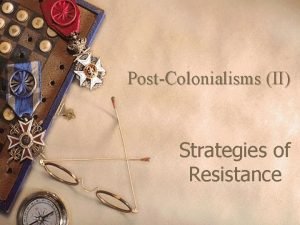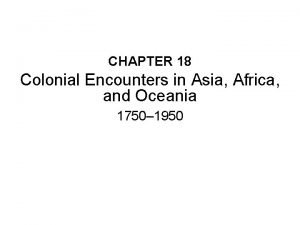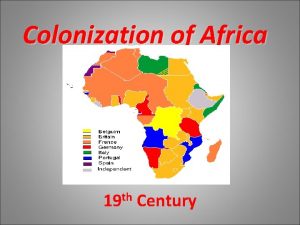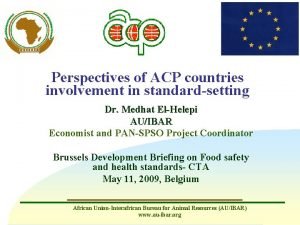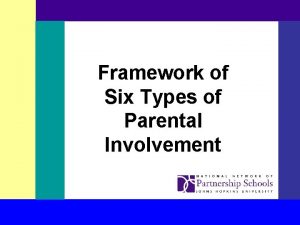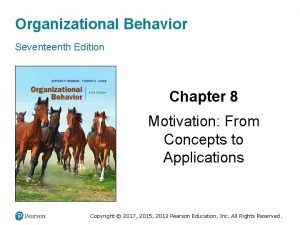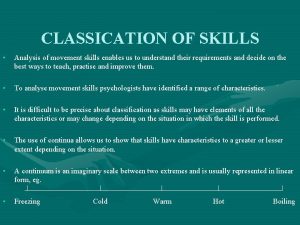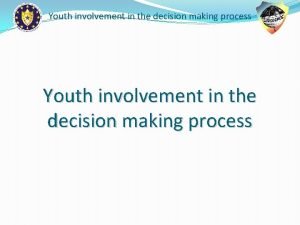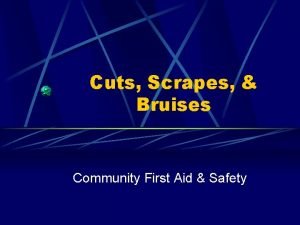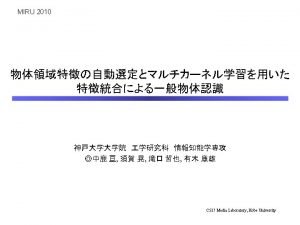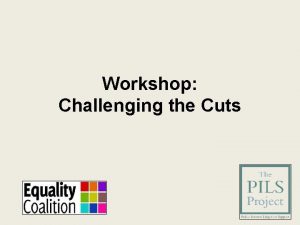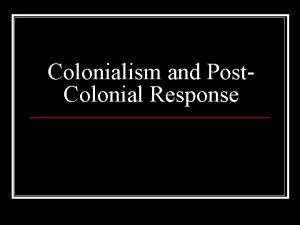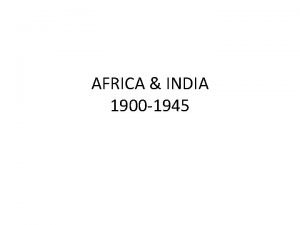Africa Post Colonial Africa Euro Cuts involvement in






















- Slides: 22

Africa

Post Colonial Africa Euro. Cuts involvement in Afr (c. 1920 -1945) -cut budgets - white settlers take land from African farmers -closed schools & churches -sell assets to pay war debt

Rising expectations for independence & modernization Post WWII boom in Afr. products Use Afr. Troops in WWII= rising discontent w/ Euro -White settlers seize more land & est. Apartheid in South Africa Renewed post WWII interest in Africa

Most countries= indep. By 1960, but boundaries divide some tribes and put hostile ones together in the same country Emergence of AIDS epidemic Nigeria 250 ethnic groups 395 languages 3 major religions Colonial borders=little national loyalty

Virtual Collapse of Africa’s econ since 1970 b/c 1. Most Technology doesn’t work in Africa 2. Farmers don’t like collectivization 3. Deteriorating Environment 4. Lack of foreign investments 5. Lots of Corruption 6. Local gov’t resist national gov’t 7. High rate of HIV/AIDS 8. Famine 9. Genocide 10. Bad Leaders 11. Other

• 1. Much of Africa lacks the infrastructure for modern technology. The vastness of the continent makes it difficult to interconnect it. • -Infrastructure – the large-scale public systems, services, and facilities needed for economic activity including: power & water supplies, public transportation, telecommunications, roads, and schools. • 3. Deterioration of Environment • Desertificationthe turning of fertile land into desert. • - Caused by natural erosion, over-grazing, over-farming, harvesting of trees, drought • - Destroys ecosystems, leads to extinct animals and plants.

• 2. Collective farms might produce more crops, but farmers lose the land their families have had for generations & they lose the ability to grow what they want, including food for the family. Shift from subsistence farming to cash crops • 4. Lack of Foreign investments- many foreign companies that operate in Africa do not re-invest in Africa. Some do not even hire local workers. What does this mean? Companies get rich African countries do not get much if any of the revenue. (like imperialism)

• 5. Lot of Corruption in gov’ts. • Corruptiondishonest exploitation of power for personal gains. Ex. Bribes, small percentage of people getting money from natural resources • 8. Famine • -a severe shortage of food resulting in widespread hunger and starvation. • Causes- Drought, Desertification, War, shift from subsistence farming to cash crops • Ex. - see Africa Map Assignment


• 6. Local gov’t resistance to national gov’t. Most countries were not ‘countries’ before imperialism, they were tribal. The idea of countries and central gov’ts is foreign. • 9. Genocide- the systematic killing of all the people from a national, ethnic, or religious group; or the attempt to do so. See Africa Map Assignment. • Examples- Rwanda (Hutus/Interhamwe v. Tutsi) >500, 000, Darfur region of Sudan (Gov’t/militia v. tribal farmers) >250, 000, Tanzania (Albinos) <500, Somalia (Warlords/Clans v. Clans) >140, 000


• 7. High rate of HIV/AIDS • - Reasons- Social, Political, Economic • -8 of the top of 10 countries with the highest # of people living with HIV/AIDS are in Africa (India is # 4, USA is # 10). • -Very low life expectancies • Political • - Misinformation- AIDS-denialists claim • AIDS is not caused by HIV • -lack of infrastructure, corruption with in donor & gov’t agencies, misused resources

• -Economic • - Lack of healthcare/money – no advanced medical facilities, no money for medicine, many women join the world’s oldest profession to feed their families, many healthcare workers move out of Africa for better jobs/wages • -Social • -Superstition- stigma to having AIDS and using condoms • HIV fatigue- people are so tired of hearing about HIV/AIDS they don’t listen anymore.


• 10. Bad Leaders- ruthless dictators, who exploit their own people for personal gain. Brutal, Oppressive, Violence, • Ex. Idi Amin- in Uganda, >300, 00 killed, fled the country leaving a debt of >$250 million, has been called Africa’s Adolf Hilter. • Omar Al-Bashir- current leader of Sudan • Charles Taylor- elected president of Liberia, personal wealth is more than GDP of Liberia, supports rebels in Sierra Leone by smuggling blood diamonds from SL. UN sanctions against Liberia, •

• Robert Mugabe- Zimbabwe- land redistribution, targets whites and opposition, Has praised Hitler, blamed for economic collapse, believe to be stealing $. • Mobutu- Zaire (DRC)- embezzled >$5 billion, human rights violations, mismanagement of econ, corruption.

• 11. Other • Civil Wars • Blood Diamonds- diamonds used to finance civil wars, genocides • Child Soldiers- kids kidnapped as young as 6 and turned into killing machines • Many of the poorest countries in the world are in Africa • Malnutrition • Low life expectancy, high infant mortality • High illiteracy rate, little access to education

• Signs of Hope in Africa • Rising standard of living • Developing skills for the 21 st century- increasing schooling • Regional economic associations are breaking reliance on foreign aid • Regional/Continental Alliances help with military intervention- African Union • More access to healthcare • Cities • Football teams • Olympic Participation • People rising up against oppressive gov’ts- Egypt & Libya

South Africa

Slavery abolished by the Brits 1899 - Zulu Wars b/w Brits, Dutch, Bantu Tribes 1910 - Independent Union of South Africa formed (run by white minority)

1948 - Apartheid System based on segregation of races & white dominance Foreign pressure to end Apartheid -no Olympic participation 1912 - African National Congress formed led by Black African leaders to lobby for rights Resistance mvts. Economic Pressure -UN sanctions against trade Apartheid Laws -Where you could live, travel, eat -Who you could marry -Could be jailed w/o trial, forever

1994 - first free elections- ANC wins majority of votes. Nelson Mandela becomes president (he spent 27 years in jail form 1960 -1990 for inciting strikes, trying to leave the country and sabotage) 1996 - Apartheid ends
 Post colonial theory
Post colonial theory Burudika na coke baridi
Burudika na coke baridi Postcolonial theory literature
Postcolonial theory literature Resistance history definition
Resistance history definition Chapter 18 colonial encounters in asia and africa
Chapter 18 colonial encounters in asia and africa Colonization of africa
Colonization of africa Colonial encounters in asia africa and oceania
Colonial encounters in asia africa and oceania Panther involvement network
Panther involvement network Father involvement in early childhood
Father involvement in early childhood Panther involvement network
Panther involvement network Glickman's classification of furcation
Glickman's classification of furcation Six types of parental involvement
Six types of parental involvement How can employee involvement measures motivate employees
How can employee involvement measures motivate employees Brazil ww2 involvement
Brazil ww2 involvement Panther involvement network
Panther involvement network Tarnside curve of involvement
Tarnside curve of involvement Contoh kasus social judgement theory
Contoh kasus social judgement theory Principle of purposeful expression of feelings examples
Principle of purposeful expression of feelings examples A national policy of avoiding involvement in world affairs
A national policy of avoiding involvement in world affairs Pacing continuum
Pacing continuum Define active community participation
Define active community participation Gaisce personal skill ideas
Gaisce personal skill ideas Involvement decision making
Involvement decision making



